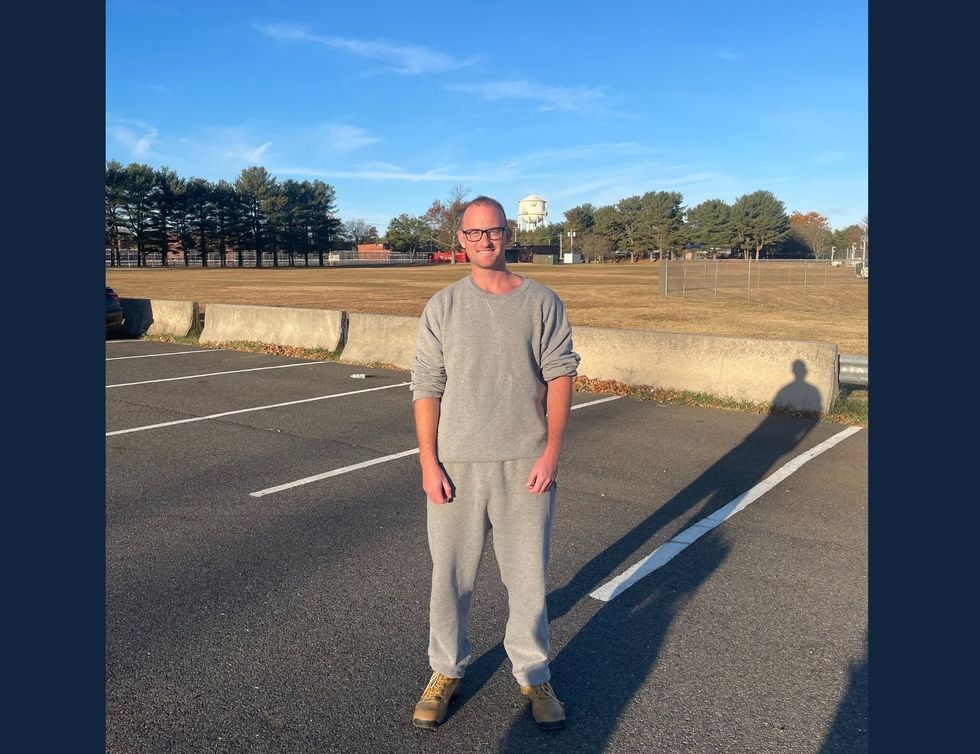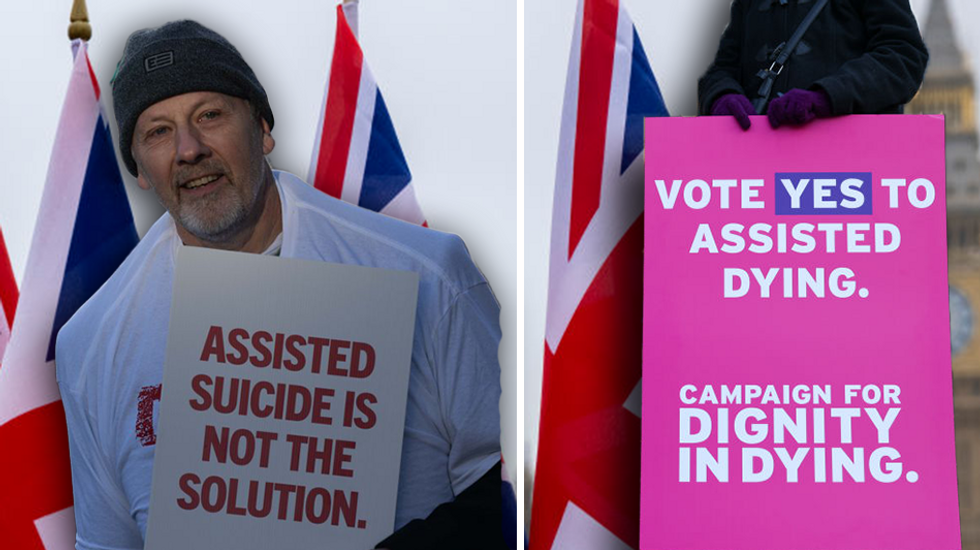10 things I learned in prison
Pat Stedman was released from federal prison on October 27, 2024, after serving a year behind bars for his presence in the U.S. Capitol on January 6, 2021. Stedman was in Washington, D.C., that day to protest 2020 election fraud and to petition Congress to vote against certifying the election prematurely in order to give the various swing states the opportunity to investigate voting irregularities, as was requested by numerous members of their legislatures. While Stedman followed the crowd into the Capitol and shouted along with them, he did not engage in any violence. Nonetheless, he was sentenced to 48 months for a felony offense, obstruction of an official proceeding — an Enron-era financial crimes law that theJustice Department weaponized against January 6 protesters. Stedman was released early following the Supreme Court's ruling that prosecutors had applied the obstruction law — originally meant to target the destruction of evidence — too broadly. *********** Just under two weeks ago I was released from federal prison, one year to the day that I came in. Here are 10 things I learned in this crucible.1. Your opinion doesn’t matter In the civilian world, everyone feels entitled to say what they want, and most people take offense when others don’t agree with them. We live in an outrage culture that thrives on people spouting off on each other. This is basically X. In prison, this kind of behavior isn’t wise. Unless asked, you keep quiet about your opinions and learn to tolerate others. You don’t provoke them. Arguments turn violent frequently. If you want to be right, prepare to fight. And don’t get me started on the knives people make. The human mind placed under pressure is capable of incredible ingenuity. 2. Respect is paramount Prison was one of the most respectful environments I’ve been in. More respectful than a country club. Everyone says “excuse me” or “my bad” when passing by someone or interrupting a conversation. You hold doors for others. Entitled behavior is punished. The higher security the prison, the more dangerous it gets. Even moving someone’s chair without asking can lead to violence. But it's easy to avoid conflict. If you stay out of ego and treat people with respect, you will have few problems. 3. Necessity is truly the mother of invention No lighter and want to smoke a cigarette? Two batteries and a wire will do the trick. Want to cook but no stove or microwave? You can boil water in a bucket with two cables wrapped around a metal slab plugged into an outlet. I’ve even seen a convection oven built out of soda cans and loose wires. And don’t get me started on the knives people make. The human mind placed under pressure is capable of incredible ingenuity.4. Prisons are mental institutions After long stretches in prison, even strong men start to lose it. In some cases it’s obvious — people talking to themselves. But in most cases it’s more subtle. Looping conversations. Pacing the room back and forth constantly. Hoarding junk. Easily stressed by inconveniences. Paranoid. Long lockdowns, boring routines, and constant assaults on humanity by guards can bring you down to an animal-like level. Some people come in like this. But most are made this way by the conditions. There's a term for it: "institutionalized." 5. Paperwork matters The two classes of offenders at the bottom of the totem pole in prison are chomos (“child molesters,” used as a catch-all term for all sex offenders) and rats. It is very important that you have your prisoner "paperwork" to prove that you're not one of them. Fort Dix is a dumping ground for these types of prisoners, so they are allowed on the yard, unlike in higher-security prisons. But they are still the bottom of the totem pole and are disproportionately targeted for extortion and robbery. Rats in particular are despised, which is understandable considering that most inmates are in prison because of them. Have your paperwork ready, or keep a low profile and stick to where you're allowed. 6. Race is real and relevant Prison is a tribal environment. You are categorized immediately based on your ethnicity and filtered accordingly into “cars.” White guys have their table. Puerto Ricans, Dominicans, Mexicans, etc. each have their own as well. Black guys organize based on geography, i.e. New York, Pennsylvania, Carolina. You can join their car even if you aren’t black, but it only happens rarely, usually if the guy in question also came from “the hood.” The separation creates stability; the differences are apparent and universally recognized. But respect is color-blind. There are dirtbags in every race as well as honorable men. The good men are friendly with each other regardless of background. Conflict between cars is uncommon and avoided at all costs. It's called "crashing out," and gets ugly. To avoid this, troublemakers are policed by their own. 7. Everything is relative Fort Dix was real prison to me. But to


Pat Stedman was released from federal prison on October 27, 2024, after serving a year behind bars for his presence in the U.S. Capitol on January 6, 2021.
Stedman was in Washington, D.C., that day to protest 2020 election fraud and to petition Congress to vote against certifying the election prematurely in order to give the various swing states the opportunity to investigate voting irregularities, as was requested by numerous members of their legislatures.
While Stedman followed the crowd into the Capitol and shouted along with them, he did not engage in any violence.
Nonetheless, he was sentenced to 48 months for a felony offense, obstruction of an official proceeding — an Enron-era financial crimes law that theJustice Department weaponized against January 6 protesters.
Stedman was released early following the Supreme Court's ruling that prosecutors had applied the obstruction law — originally meant to target the destruction of evidence — too broadly.
***********
Just under two weeks ago I was released from federal prison, one year to the day that I came in. Here are 10 things I learned in this crucible.
1. Your opinion doesn’t matter
In the civilian world, everyone feels entitled to say what they want, and most people take offense when others don’t agree with them. We live in an outrage culture that thrives on people spouting off on each other. This is basically X.
In prison, this kind of behavior isn’t wise. Unless asked, you keep quiet about your opinions and learn to tolerate others. You don’t provoke them. Arguments turn violent frequently. If you want to be right, prepare to fight.
And don’t get me started on the knives people make. The human mind placed under pressure is capable of incredible ingenuity.
2. Respect is paramount
Prison was one of the most respectful environments I’ve been in. More respectful than a country club.
Everyone says “excuse me” or “my bad” when passing by someone or interrupting a conversation. You hold doors for others. Entitled behavior is punished. The higher security the prison, the more dangerous it gets. Even moving someone’s chair without asking can lead to violence.
But it's easy to avoid conflict. If you stay out of ego and treat people with respect, you will have few problems.
3. Necessity is truly the mother of invention
No lighter and want to smoke a cigarette? Two batteries and a wire will do the trick. Want to cook but no stove or microwave? You can boil water in a bucket with two cables wrapped around a metal slab plugged into an outlet.
I’ve even seen a convection oven built out of soda cans and loose wires. And don’t get me started on the knives people make. The human mind placed under pressure is capable of incredible ingenuity.
4. Prisons are mental institutions
After long stretches in prison, even strong men start to lose it. In some cases it’s obvious — people talking to themselves. But in most cases it’s more subtle. Looping conversations. Pacing the room back and forth constantly. Hoarding junk. Easily stressed by inconveniences. Paranoid.
Long lockdowns, boring routines, and constant assaults on humanity by guards can bring you down to an animal-like level. Some people come in like this. But most are made this way by the conditions. There's a term for it: "institutionalized."
5. Paperwork matters
The two classes of offenders at the bottom of the totem pole in prison are chomos (“child molesters,” used as a catch-all term for all sex offenders) and rats. It is very important that you have your prisoner "paperwork" to prove that you're not one of them.
Fort Dix is a dumping ground for these types of prisoners, so they are allowed on the yard, unlike in higher-security prisons. But they are still the bottom of the totem pole and are disproportionately targeted for extortion and robbery.
Rats in particular are despised, which is understandable considering that most inmates are in prison because of them. Have your paperwork ready, or keep a low profile and stick to where you're allowed.
6. Race is real and relevant
Prison is a tribal environment. You are categorized immediately based on your ethnicity and filtered accordingly into “cars.”
White guys have their table. Puerto Ricans, Dominicans, Mexicans, etc. each have their own as well.
Black guys organize based on geography, i.e. New York, Pennsylvania, Carolina. You can join their car even if you aren’t black, but it only happens rarely, usually if the guy in question also came from “the hood.”
The separation creates stability; the differences are apparent and universally recognized.
But respect is color-blind. There are dirtbags in every race as well as honorable men. The good men are friendly with each other regardless of background. Conflict between cars is uncommon and avoided at all costs. It's called "crashing out," and gets ugly. To avoid this, troublemakers are policed by their own.
7. Everything is relative
Fort Dix was real prison to me. But to guys who came from the higher-security institutions, it wasn’t.
You could go outside regularly. There weren’t bars on your cell doors. Even during lockdowns, you could still move around the building, use phones and computers, sometimes even watch TV.
I came to appreciate little things a lot. Being able to go to the gym, a little extra food at the chow hall, getting your comissary early, an unlocked door so you could move around easier — these all felt like “freedom.”
The abundance we have on the outside is amazing. After this year, something as simple as bread with butter and jam tasted like heaven to me.
8. Our information overload is extreme
After two days back in the “real world,” I was absolutely overwhelmed by the amount of information we receive. In prison, I had no access to the internet and limited communication with the outside world.
I didn’t scroll through feeds or messages. I talked to people or read. I was focused and present, had real conversations, actually learned some things. I can already feel the siren song of distraction calling me since I’ve been back.
Honestly, I prefer the clarity I had in there to the deluge of nonsense out here. There is something wrong with the way we are living. It's not healthy or natural, and that explains so much of our growing social dysfunction.
9. You really notice women
Being around high-testosterone men 24/7, you become very attuned to even the slightest amount of feminine energy in the environment. Everyone notices female guards, even if they don’t gawk at them.
Little flourishes of femininity go a long way. You can almost smell it before you see it. I remember staring at my wife during visits, intoxicated by her presence. This was about more than just sex. The way her hair fell on her shoulder, the way she moved. Everything about her was refreshing — I just wanted to take it all in.
10. You can adjust to anything
My first few weeks in prison were tough. There were a lot of rules I didn’t understand that I had to learn. And to put it lightly, it was a very different environment to get used to, with very different types of people.
But then all of a sudden, all this newness became normal. I was living in a ghetto behind barbed-wire fences, and there wasn’t anything weird about it. I’d fist-bump gangsters and sneak apples out of the chow hall in my socks, as if this was just a part of life.
It’s still surreal for me to look back on it. I just left this world. And it already feels like a dream.
Originally Published at Daily Wire, World Net Daily, or The Blaze
What's Your Reaction?

































































































